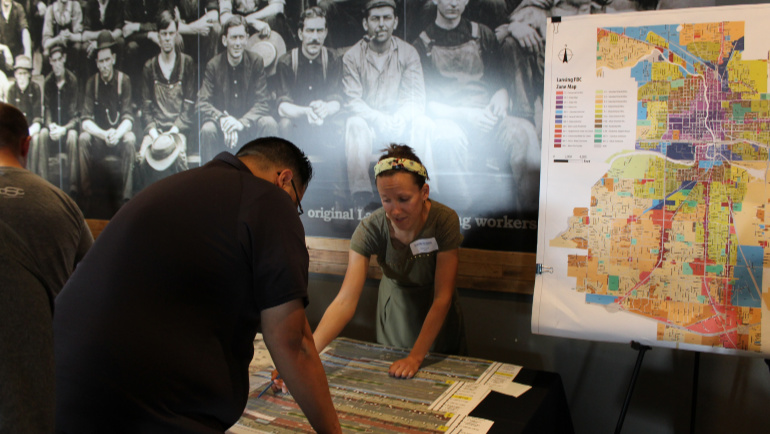
Wayne State University's Transformative Research in Urban Sustainability Training (T-RUST) program is recruiting outstanding applicants for a new, interdisciplinary National Science Foundation-funded Ph.D. and M.S. training program in urban sustainability. Foundational support for graduate study will be provided, with additional support likely available through other programs. Learn more here.
Students may earn $34,000 per year from the National Science Foundation and receive a $21,703 cost-of-education allowance per year of fellowship support. Students can pursue a Ph.D. or M.S. in anthropology, biology, civil engineering, education, environmental health sciences, geology, pharmaceutical sciences, pharmacology, physiology, urban planning, economics, or communication with a focus in urban sustainability.
Fellowships are available to support students who are committed to integrating perspectives from multiple disciplines to address emerging ecological, social, economic and technological challenges in urban sustainability. T-RUST seeks to build a diverse cohort of incoming fellows and strongly encourages applicants from groups traditionally underrepresented in science, technology, engineering and mathematics (STEM) fields, including American Indians/Alaska Natives, African Americans, Hispanics, Pacific Islanders (such as natives of Hawaii, Guam and Samoa), persons with disabilities, veterans and/or women.
The program will provide innovative graduate-level training that integrates social and physical sciences, technology, engineering, and mathematics. The program’s vision is to train students to work with local communities, businesses, industries, scientists and policymakers to understand and address sustainability challenges faced in urban settings.
Successful applicants will participate in a new interdisciplinary training program that includes:
- Cutting-edge research methods to address complex, multidisciplinary environmental problems.
- Thesis/dissertation development with an interdisciplinary team and internationally recognized faculty advisors.
- Network and communication skill building through interaction with policymakers, practitioners, industry representatives and the broader public.
- Paid internships, professional development, community service opportunities and leadership training.
- Student exchange programs in Windsor, Baltimore and Puerto Rico.
- Attendance at local, regional, national and international conferences, with expenses paid.
Specific research themes include:
- Urban Ecological Systems – The evaluation and maintenance of ecosystem services requires the integration of natural science, social science, and engineering-based environmental studies with community and education outreach research projects to sustain the urban ecological systems upon which human quality of life depends.
- Urban Redevelopment and the Blue Economy – From land use and urban redesign to global supply chain and behavioral economics, plus sociological and natural systems that make cities healthy and vital places, this research track unites social and physical sciences with engineering and design for spatially and socially integrated solutions. Studies of the “blue economy” are particularly relevant for cities with waterfronts that are reinventing themselves.
- Sustainable Urban Water Infrastructure – Analysis of the natural, engineered and societal systems that have formed the current water infrastructure of Detroit will provide National Science Foundation Research Traineeship Program participants a foundation for understanding the complex interrelationships and progressive solutions for sustainable urban infrastructure. Specialties within this track include drinking water treatment and distribution, wastewater management, and the use of big data and sensor technologies in decision-making for improved infrastructure sustainability.
